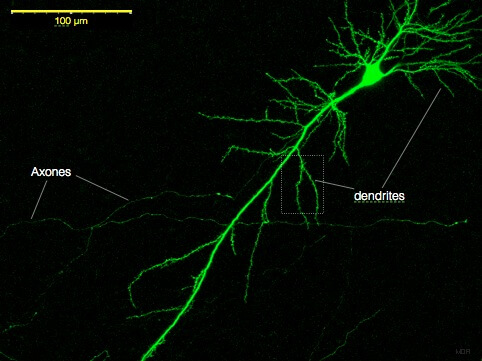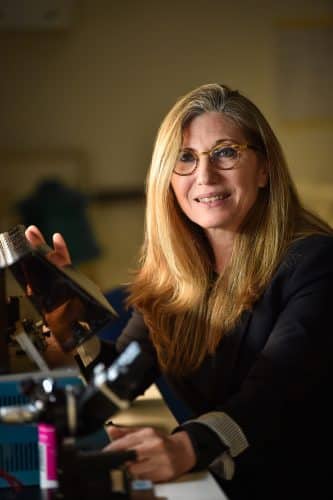Engineers and scientists at the Technion are increasing their collaboration to expand and deepen research and development in the field of the brain. An example of this is the formation of a group of researchers from many diverse faculties at the Technion, led by Prof. Jackie Schiller. Schiller recently also published an article on the dendrites, the main input sites of the nerve cell.

Dendrites - the trees of the brain
An article by Prof. Jackie Schiller and PhD student Maya Sandler sheds light on some of the basic questions related to the influence of the cortex, the cerebral cortex, on various functional aspects such as emotions, thinking and psychiatric disorders. In the article, published in the prestigious journal Neuron, the mechanisms of brain plasticity related to anticipation, feedback, learning and memory are examined. The researchers estimate that his findings may lead to the development of new approaches to the treatment of learning and memory disorders and even behavioral disorders such as autism.
The brain is made up of a complex network of interconnected nerve cells. The neuron, which is the basic processing unit of the neural network, is itself a complex processing unit that receives many data from other neurons and processes them into an output that is transmitted to thousands of other neurons in the network.
The nerve cell consists of organelles: (1) the cell body and the nucleus responsible for producing proteins and maintaining the entire cell; (2) the axon, which is a branched extension that leaves the cell body and transmits information (output) to thousands of other nerve cells in the network; (3) the dendrites, the main input sites of the nerve cell and which enable the cell to receive and process information from the axons of thousands of neighboring cells; (4) The synapses, the connection point between the axon of one cell and the dendrite of another cell. All of these communication channels - axons, dendrites and synapses - are essential to brain function because they determine our motor, cognitive and other abilities.
The dendrites, which are the majority of the gray matter and occupy most of the volume of the cortex, are the focus of Prof. Schiller's research in recent years. These are tree-like extensions that are a few millimeters long, which allow the cell to receive information from other nerve cells. In previous articles Prof. Schiller showed that dendrites are not simple structures but rather complex calculating machines, and in the current article she presents their unique flexibility mechanism. "During learning, this mechanism changes the dendrite and the synapse, and if we understand it, we may be able to improve processes such as information absorption. We are now focusing on understanding dendritic activity at the micro level but also at the network level, hoping to understand physiological mechanisms related to health and disease."

Deepening the collaboration between researchers from different fields
Prof. Yoram Gutfreund from the Rapaport Faculty of Medicine studies the auditory system of respiration and its orientation in space. Prof. Miriam Sachsenhuis from the Faculty of Mechanical Engineering develops technologies for operating electronic instruments with the power of thought. Prof. Yitzhak Schiller from the Faculty of Medicine invents innovative methods for the treatment of epilepsy and Parkinson's. Prof. Ron Meir from the Faculty of Electrical Engineering researches and develops artificial neural networks, which show unprecedented performance in the fields of learning and pattern recognition.
These researchers and many others from various faculties at the Technion have been strengthening their ties in recent years in order to expand and deepen the study of the brain in its various aspects: learning and memory, sensory perception, activity of the movement system, the relationship between the immune system and the brain, basic biological processes in the nerve cells and cells that support the brain, communication between nerve cells and more. Some are also looking for ways to repair brain damage, find solutions for neurological injuries, and the like.
Prof. Ido Arab from the Faculty of Industrial Engineering and Management is a psychologist who studies basic learning processes. "Today, after many years of research in the behavioral field, I understand that physiological data from the field of brain research will allow me to check if my assumptions are correct and to better understand mechanisms such as decision-making," he says.
Prof. Itamar Kahn from the Faculty of Medicine uses fMRI technology to study the brain activity responsible for integrating the data of the various senses and combining the data to create memories and perform movements. "I am mainly trying to understand disruptions in this system, and it is clear to me that cooperation with the engineering faculties at the Technion could lead not only to a better understanding, but also to interesting robotic applications that will be operated directly on the brain and assist in actions such as walking."
Dr. Shahar Kotinsky is engaged in the development of non-standard computer architectures inspired by the brain structure and focuses mainly on neuromorphic computers that imitate the mechanism of action of the cerebral cortex. "The classical computer is built from a calculation unit (processor) and a storage unit (memory) - not the typical structure of the brain. If we design computers that are inspired by the brain and contain components that function similarly to synapses and neurons, they will perform human actions such as recognizing faces much more efficiently than existing computers. That's why a connection between us engineers and brain researchers is requested here."
"In recent decades, brain research has become a diverse and multidisciplinary research field," explains Prof. Jackie Schiller from the Rapaport Faculty of Medicine. "Engineering tools are an integral part of the development of brain research and the application of brain devices as a solution to motor and cognitive limitations. There is enormous potential in artificial systems that mimic the human brain, and today it is clear to us that only a synergy between various biological, computational and engineering disciplines will lead to significant progress in understanding the brain and its functions. Therefore, extensive and interdisciplinary research activity anchored in in-depth and coherent theoretical work and in pre-clinical and clinical experiments is needed here."
In the research group being formed under the leadership of Prof. Jackie Schiller, the members are researchers from many and diverse faculties: Prof. Yonina Elder (Electrical Engineering), Prof. Simon Englander (Medicine), Associate Prof. Rakfat Ackerman (Industrial Engineering and Management), Prof. Naama Brenner ( Chemical Engineering), Associate Prof. Omri Barak (Medicine), Prof. Yoram Gutfreund (Medicine), Associate Prof. Dori Derdikman (Medicine), Prof. Herman Voloskir (Medicine), Prof. Noam Ziv (Medicine), Prof. Alon Wolff (Mechanical Engineering), Prof. Miriam Sachsenhuis (Mechanical Engineering), Associate Prof. Ronan Talmon (Electrical Engineering), Prof. Emeritus Mousa Laim (Medicine), Prof. Eldad Yachiam (Industrial Engineering and Management), Prof. Ron Meir ( Electrical Engineering), Prof. Shimon Marom (Medicine), Prof. Hillel Perat (Medicine), Prof. Ido Arab (Industrial and Management Engineering), Associate Prof. Itamar Kahn (Medicine), Associate Prof. Shahar Kutinsky (Electrical Engineering) , Associate Prof. Asia Rawls (Medicine), Prof. Yitzhak Shiler (Medicine) and other researchers.

One response
Are there links somewhere to her articles that are discussed in this article?
I would love to read more about it